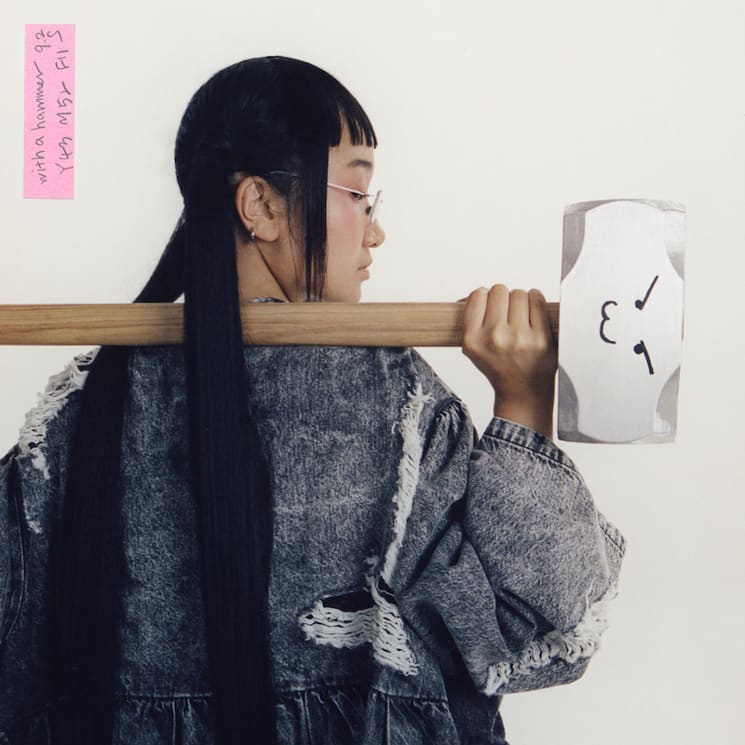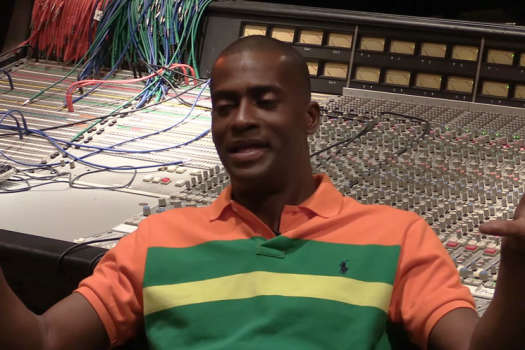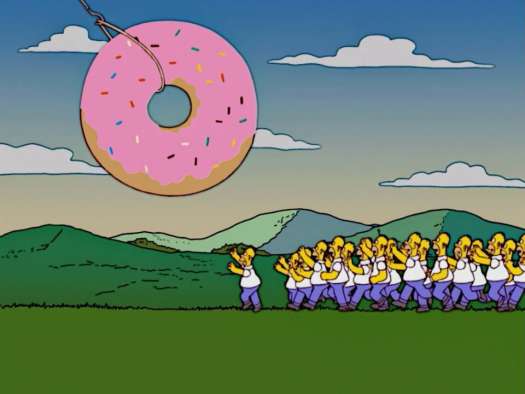Kathy Yaeji Lee, the singer-producer-DJ known simply as Yaeji, keeps four notebooks in rotation, each with its own purpose: one resembles a gratitude journal that encourages daily assessments of her spiritual fulfillment based on a set rubric, while another is reserved for administrative matters, such as meetings and appointments; there's one in which she logs hour-by-hour breakdowns of how her days are spent; and in the fourth notebook, her creative mind spills across the pages.
What We Drew 우리가 그려왔 — the mixtape Yaeji released in 2020 — plays as if modelled on that last one, bursting with scattershot ideas, bright hues, and unconstrained by the parameters that govern her other notebooks. Planted within that project's adventurous palette is one track, titled "Waking Up Down," that pokes fun at Yaeji's penchant for order, as evidenced through her careful cataloging of life. In a clipped, robotic tone, the artist lists all the things she's got "down," ticking off quotidian accomplishments like getting out of bed, cooking, hydrating — listening, even — while sounding drained by the tedium of it all. The chorus, sung in Korean with an ironically cheerful melody, underlines the thinking that drives her to monitor routines so closely: "It's not easy / There's no such thing as easy / If I'm lazy / They all say it's my fault."
By contrast, Yaeji's debut album, With A Hammer, emphasizes everything she has gained from her self-documenting practices. "When you write it down / The thoughts dissipate and it's freeing," she sings in her airy voice on "I'll Remember For Me, I'll Remember For You," a song which finely outlines how safeguarding a trove of memories strengthens her ties to other people. On "Passed Me By," she says, "I like flipping the pages and feeling the physical weight of how much time has" — her nursery rhyme cadence cuts off, with the sentence completed by a spiralling repetition of the song's title. Yet, with a grip on time (or at least her perception of it), Yaeji hampers the spiral and drags the track to a languid tempo, swaggering across as she leads a triumphant chant.
Other moments on the album show Yaeji fazed by the rush of time, acknowledging the limits of her techniques to curb and segment it. "For Granted" questions whether she's moving slowly enough to process and appreciate her life: "When I sit with myself / Do I feel it now? / How it got to be this way / How it got to be so good." The track starts at a lumbering pace — its rhythm dotted by punches of an 80's-style video game synth — and then once Yaeji resolves to "let it flow" rather than overthink, it catapults into a downpour of drum-and-bass breakbeats. Later, over the title track's stiff industrial beat, she raps, with little trace of human affect, about days when she "gave up," wished to be ejected from reality ("To take a break from the truth / To take a break from the false") and linear time ("To take a break from the past / To take a break from the now").
The cyberpunk aesthetics that Yaeji employs speak to this theme of the self as something one might modify, upgrade, shut off, or offload. The fierce, fluorescent velocity of the breakdown on "For Granted" summons an image of Yaeji hacking into the mainframe of her mind, searching for a way to disable her desire for meaningful patterns in every piece of data she encounters. In the song's music video, there are quick flashes of her dressed in different outfits, as if she's an avatar being customized. The possibilities seem limitless, but as cyberpunk warns that technological advancement cannot enhance personhood — only dilute or erase it — Yaeji counters all the rugged electronics on her album with a quest narrative that resounds as deeply human.
She first publicly detailed this narrative when speaking with cultural critic and poet Hanif Abdurraqib on his podcast Object of Sound in April of 2022. Before the interview, she sent Abdurraqib what he described as a flowchart, with a drawing at the centre of Yaeji holding a hammer and a spiral line wrapping around her, labelled with a series of phases that starts with "Leaving room for myself to breathe" and ends with "I am more open to the presence of my past selves." The quest involved learning how to wield Hammer, which Yaeji has described as a character unto itself — a manifestation of her own character's anger, yet one that accompanies her like a pet, or a friend.
Like the Kill Bill "Ironside" siren, the wonky synthline that starts and persists throughout "Fever" signals Yaeji is seeing red, tapping into a reservoir of rage that first bubbled up on What We Drew 우리가 그려왔 with tracks like "In Place 그자리 그대로" and "In the Mirror 거울." "Why are we the ones to always run away? / Why are we the ones to always apologize?" she asks in Korean, rapping at a militant clip as the beat mutates into more menacing forms around her. Throughout her career, Yaeji has shared in interviews that her upbringing entailed a lot of moving around — between the US, Japan and South Korea — which resulted in her always feeling stuck on the periphery of wherever she found herself, isolated due to race or cultural difference. Only over the last few years, while introspecting and conceptualizing this album, did she figure out how to channel the suppressed emotions of her younger self. On "Michin," a pummeling jungle track with production assistance from Enayet, she finally reaches for Hammer: "I kick down the door / And face it straight."
The space cleared by the catharsis that takes place on "Fever" and "Michin" gives way to joyful house steppers like "Ready or Not" and "Happy," the former featuring producer K Wata and the latter Nourished by Time, who glides through his verse with a sophisticated R&B flair. These tracks sit closest to the liquidy, atmospheric club fare on which Yaeji built her name, but this debut album stands on its own as an artistically daring personal statement. With a Hammer couldn't have been released in 2020, when Yaeji was prioritizing collaboration as the ethos behind her comparatively faceless mixtape; it required her to keep digging through her past, taking inventory to discover what story she had to tell. On "Passed Me By," in reference to that diminished former self within her, she says in English, "How she came to me one by one," and then in Korean, "I almost didn't recognize you."
(XL Recordings)What We Drew 우리가 그려왔 — the mixtape Yaeji released in 2020 — plays as if modelled on that last one, bursting with scattershot ideas, bright hues, and unconstrained by the parameters that govern her other notebooks. Planted within that project's adventurous palette is one track, titled "Waking Up Down," that pokes fun at Yaeji's penchant for order, as evidenced through her careful cataloging of life. In a clipped, robotic tone, the artist lists all the things she's got "down," ticking off quotidian accomplishments like getting out of bed, cooking, hydrating — listening, even — while sounding drained by the tedium of it all. The chorus, sung in Korean with an ironically cheerful melody, underlines the thinking that drives her to monitor routines so closely: "It's not easy / There's no such thing as easy / If I'm lazy / They all say it's my fault."
By contrast, Yaeji's debut album, With A Hammer, emphasizes everything she has gained from her self-documenting practices. "When you write it down / The thoughts dissipate and it's freeing," she sings in her airy voice on "I'll Remember For Me, I'll Remember For You," a song which finely outlines how safeguarding a trove of memories strengthens her ties to other people. On "Passed Me By," she says, "I like flipping the pages and feeling the physical weight of how much time has" — her nursery rhyme cadence cuts off, with the sentence completed by a spiralling repetition of the song's title. Yet, with a grip on time (or at least her perception of it), Yaeji hampers the spiral and drags the track to a languid tempo, swaggering across as she leads a triumphant chant.
Other moments on the album show Yaeji fazed by the rush of time, acknowledging the limits of her techniques to curb and segment it. "For Granted" questions whether she's moving slowly enough to process and appreciate her life: "When I sit with myself / Do I feel it now? / How it got to be this way / How it got to be so good." The track starts at a lumbering pace — its rhythm dotted by punches of an 80's-style video game synth — and then once Yaeji resolves to "let it flow" rather than overthink, it catapults into a downpour of drum-and-bass breakbeats. Later, over the title track's stiff industrial beat, she raps, with little trace of human affect, about days when she "gave up," wished to be ejected from reality ("To take a break from the truth / To take a break from the false") and linear time ("To take a break from the past / To take a break from the now").
The cyberpunk aesthetics that Yaeji employs speak to this theme of the self as something one might modify, upgrade, shut off, or offload. The fierce, fluorescent velocity of the breakdown on "For Granted" summons an image of Yaeji hacking into the mainframe of her mind, searching for a way to disable her desire for meaningful patterns in every piece of data she encounters. In the song's music video, there are quick flashes of her dressed in different outfits, as if she's an avatar being customized. The possibilities seem limitless, but as cyberpunk warns that technological advancement cannot enhance personhood — only dilute or erase it — Yaeji counters all the rugged electronics on her album with a quest narrative that resounds as deeply human.
She first publicly detailed this narrative when speaking with cultural critic and poet Hanif Abdurraqib on his podcast Object of Sound in April of 2022. Before the interview, she sent Abdurraqib what he described as a flowchart, with a drawing at the centre of Yaeji holding a hammer and a spiral line wrapping around her, labelled with a series of phases that starts with "Leaving room for myself to breathe" and ends with "I am more open to the presence of my past selves." The quest involved learning how to wield Hammer, which Yaeji has described as a character unto itself — a manifestation of her own character's anger, yet one that accompanies her like a pet, or a friend.
Like the Kill Bill "Ironside" siren, the wonky synthline that starts and persists throughout "Fever" signals Yaeji is seeing red, tapping into a reservoir of rage that first bubbled up on What We Drew 우리가 그려왔 with tracks like "In Place 그자리 그대로" and "In the Mirror 거울." "Why are we the ones to always run away? / Why are we the ones to always apologize?" she asks in Korean, rapping at a militant clip as the beat mutates into more menacing forms around her. Throughout her career, Yaeji has shared in interviews that her upbringing entailed a lot of moving around — between the US, Japan and South Korea — which resulted in her always feeling stuck on the periphery of wherever she found herself, isolated due to race or cultural difference. Only over the last few years, while introspecting and conceptualizing this album, did she figure out how to channel the suppressed emotions of her younger self. On "Michin," a pummeling jungle track with production assistance from Enayet, she finally reaches for Hammer: "I kick down the door / And face it straight."
The space cleared by the catharsis that takes place on "Fever" and "Michin" gives way to joyful house steppers like "Ready or Not" and "Happy," the former featuring producer K Wata and the latter Nourished by Time, who glides through his verse with a sophisticated R&B flair. These tracks sit closest to the liquidy, atmospheric club fare on which Yaeji built her name, but this debut album stands on its own as an artistically daring personal statement. With a Hammer couldn't have been released in 2020, when Yaeji was prioritizing collaboration as the ethos behind her comparatively faceless mixtape; it required her to keep digging through her past, taking inventory to discover what story she had to tell. On "Passed Me By," in reference to that diminished former self within her, she says in English, "How she came to me one by one," and then in Korean, "I almost didn't recognize you."




